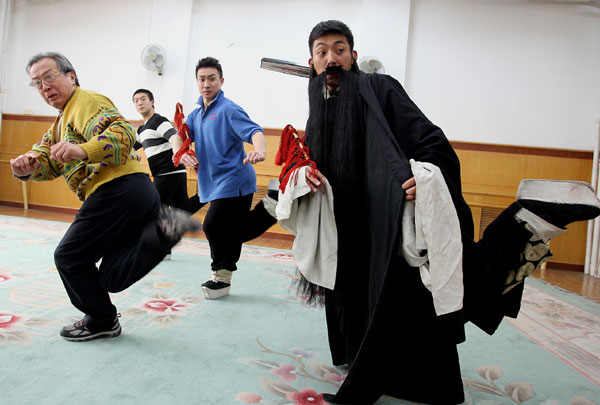
China's top opera academy will offer an undergraduate course in Tibetan Opera for the first time in 2013.
The National Academy of Chinese Theatre Arts, located in Beijing's Fengtai district, plans to enroll 37 undergraduate students majoring in five regional operas that have been recognized at State or global level as intangible cultural heritage. In addition to Tibetan Opera, the styles include Qinqiang Opera, a 2,000-year-old genre that originated in northwestern China, and Liuzi Opera, which is popular in Shandong, Henan, Jiangsu and Anhui provinces.
 |
|
Students rehearse with their teacher in the National Academy of Chinese Theatre Arts on Dec 20. ZHANG WEI / CHINA DAILY |
Zhou Long, the academy's vice-president in charge of student enrollment, said the school is currently unsure how it will allocate the 37 places among the five genres, but only the best applicants will pass the three rounds of exams, scheduled for the end of February 2013.
The selected candidates will also need to pass the college entrance exam next year, before enrolling at the academy in September 2013.
The school will waive their annual tuition fee of 10,000 yuan ($1,600) for the duration of their four-year studies, with support from Beijing municipal government, Zhou said.
The academy will work closely with regional opera troupes, as most applicants will come with recommendations from their troupes. Once admitted, the students will be instructed in Beijing for two or three years, and spend several semesters in their native province or region to put their new skills into practice, Zhou said. All candidates are expected to have received training since their youth, either at school, in a troupe, or as an apprentice to a master. After they graduate, most will return to their troupe and serve local communities, he said.
The academy is obliged to help revive marginalized operas that used to have great popular appeal. Students will improve their performance skills and understanding of the opera's history and artistic features, Zhou said.
Gesang Choegyal, deputy director of the folk arts institute in the Tibet autonomous region, said he hoped more artists, not merely actors and actresses, will graduate from the academy's program.